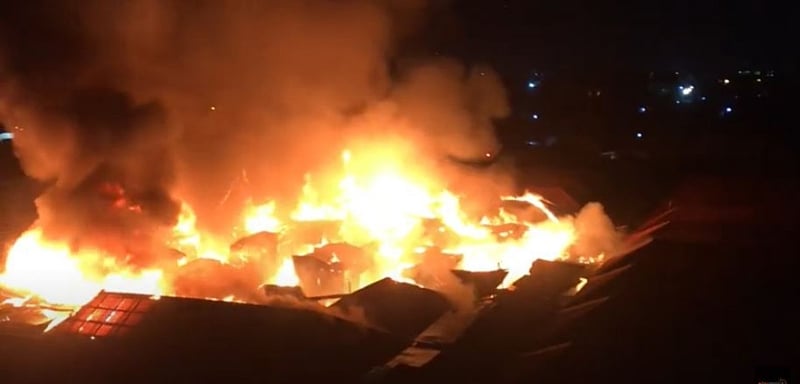The night of Saturday, June 7th, witnessed a devastating fire outbreak in Kintampo, a town nestled in the Bono East Region of Ghana. The inferno consumed a mechanic shop situated near the SDA Church, leaving a trail of destruction in its wake. Fifteen motorbikes, the primary stock of the mechanic shop, were reduced to charred remains, their once gleaming metal frames twisted and blackened by the intense heat. Adding to the toll was a commercial fufu pounding machine, a vital piece of equipment for local food preparation, and the wooden structure housing the shop itself, all completely ravaged by the flames. The incident stands as a stark reminder of the vulnerability of businesses and the swift, indiscriminate nature of fire.
Thankfully, the Ghana National Fire Service (GNFS) demonstrated commendable responsiveness. Upon receiving the alert, fire crews were dispatched promptly to the scene and engaged the blaze with determined efficiency. Their swift action proved crucial in containing the fire within minutes, preventing its spread to adjacent shops and structures clustered nearby. This rapid response undoubtedly averted a much larger catastrophe, considering the potential for the fire to escalate and engulf the surrounding area, causing further damage to property and potentially endangering lives. The successful containment of the fire underscores the critical importance of a well-equipped and efficiently operated fire service.
While the fire’s rapid suppression prevented casualties, the incident resulted in significant financial losses for the shop owner and the community. The destruction of the motorbikes represents a substantial setback for the mechanic and potentially impacts the transportation and livelihoods of those who relied on his services. The loss of the fufu pounding machine also disrupts the local food economy and highlights the broader economic ripple effects of such incidents. The destruction of property, coupled with the disruption of business activities, underscores the far-reaching consequences of fire outbreaks, particularly in smaller communities.
The immediate aftermath of the fire saw the commencement of investigations into the cause of the outbreak. While the precise origin remains undetermined pending a comprehensive investigation, preliminary assessments conducted by fire officers at the scene point to two potential culprits: electrical faults within the shop’s wiring or unattended flammable materials. Electrical malfunctions, often arising from improper wiring or overloaded circuits, are a common cause of fires in commercial establishments. Similarly, the presence of flammable materials, such as gasoline, oil, or cleaning solvents, coupled with a lack of proper storage and handling procedures, creates a significant fire hazard.
In the wake of this incident, the Ghana National Fire Service (GNFS) has reiterated its call for increased public vigilance and adherence to fire safety protocols, particularly among shop owners and mechanics who operate in environments with inherent fire risks. The GNFS emphasizes the importance of regular inspections of electrical systems to identify and rectify potential hazards. Proper wiring, adequate circuit breakers, and routine maintenance can significantly reduce the risk of electrical fires. Similarly, careful management of flammable materials is crucial. This includes proper storage in designated, well-ventilated areas away from ignition sources, as well as ensuring the prompt and safe disposal of flammable waste.
Furthermore, the GNFS strongly advocates for the installation of fire extinguishers in all workshops and commercial spaces. Fire extinguishers provide a crucial first line of defense against fires, enabling individuals to quickly suppress small flames before they escalate into uncontrollable infernos. Regular training on the proper use and maintenance of fire extinguishers is equally important to ensure that individuals can effectively utilize them in emergencies. By emphasizing proactive measures like proper wiring, safe handling of flammable materials, and the availability of fire extinguishers, the GNFS aims to empower communities to mitigate fire risks and safeguard lives and property. The Kintampo fire serves as a potent reminder of the ever-present danger of fire and the importance of prioritizing fire safety measures in every aspect of daily life.














